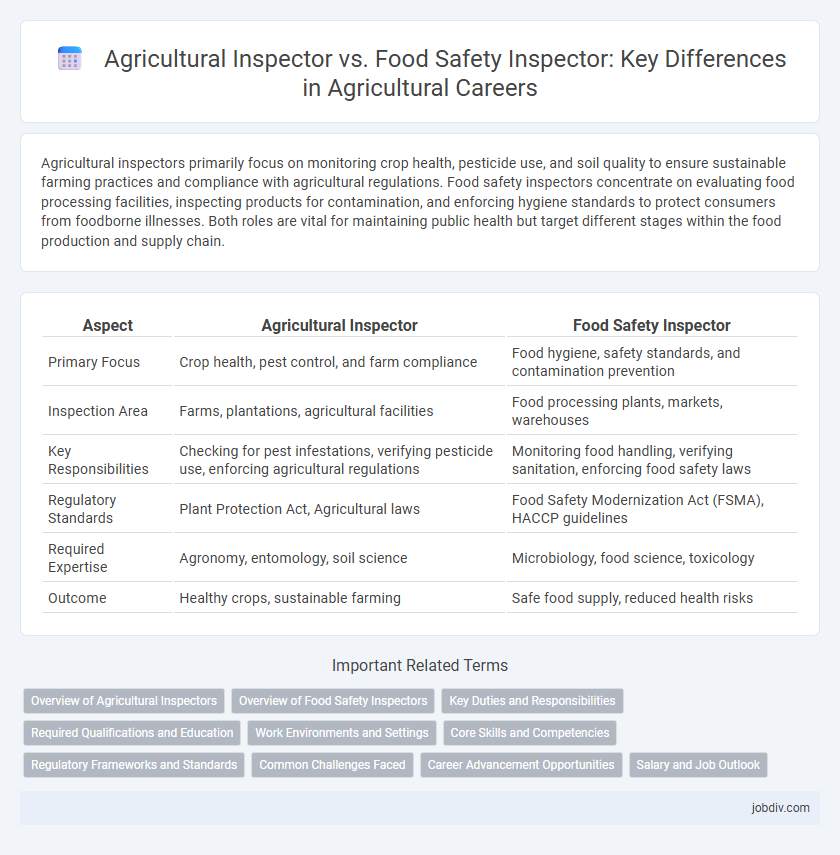Agricultural inspectors primarily focus on monitoring crop health, pesticide use, and soil quality to ensure sustainable farming practices and compliance with agricultural regulations. Food safety inspectors concentrate on evaluating food processing facilities, inspecting products for contamination, and enforcing hygiene standards to protect consumers from foodborne illnesses. Both roles are vital for maintaining public health but target different stages within the food production and supply chain.
Table of Comparison
| Aspect | Agricultural Inspector | Food Safety Inspector |
|---|---|---|
| Primary Focus | Crop health, pest control, and farm compliance | Food hygiene, safety standards, and contamination prevention |
| Inspection Area | Farms, plantations, agricultural facilities | Food processing plants, markets, warehouses |
| Key Responsibilities | Checking for pest infestations, verifying pesticide use, enforcing agricultural regulations | Monitoring food handling, verifying sanitation, enforcing food safety laws |
| Regulatory Standards | Plant Protection Act, Agricultural laws | Food Safety Modernization Act (FSMA), HACCP guidelines |
| Required Expertise | Agronomy, entomology, soil science | Microbiology, food science, toxicology |
| Outcome | Healthy crops, sustainable farming | Safe food supply, reduced health risks |
Overview of Agricultural Inspectors
Agricultural Inspectors play a critical role in maintaining the quality and safety of crops, livestock, and agricultural products by enforcing regulations related to pest control, disease prevention, and proper farming practices. They conduct field inspections, analyze soil and plant samples, and ensure compliance with federal and state agricultural laws to support food security and sustainable farming. Their work directly impacts the prevention of contaminated produce and the promotion of healthy agricultural ecosystems.
Overview of Food Safety Inspectors
Food Safety Inspectors play a crucial role in enforcing regulations that ensure the safety and quality of food products from farm to table. Their responsibilities include inspecting food processing facilities, monitoring hygiene practices, and testing food samples to prevent contamination and foodborne illnesses. Unlike Agricultural Inspectors, who primarily focus on crop health and pest control, Food Safety Inspectors emphasize compliance with health codes and standards set by government agencies such as the FDA and USDA.
Key Duties and Responsibilities
Agricultural Inspectors primarily focus on monitoring the health of crops and livestock, ensuring compliance with agricultural laws, and preventing the spread of pests and diseases. Food Safety Inspectors concentrate on evaluating food processing, packaging, and storage practices to ensure products meet safety standards and prevent contamination. Both roles involve regulatory compliance, but Agricultural Inspectors emphasize farm-level oversight, while Food Safety Inspectors target food production and distribution stages.
Required Qualifications and Education
Agricultural Inspectors typically require a bachelor's degree in agriculture, biology, or a related field, with knowledge of crop production, pest management, and agricultural policies essential for ensuring compliance with farm and environmental regulations. Food Safety Inspectors often hold degrees in food science, microbiology, or public health, emphasizing expertise in food processing, hygiene standards, and contamination prevention to enforce food safety laws. Both roles demand strong analytical skills and familiarity with regulatory frameworks but differ in their specialized educational backgrounds aligned with agricultural production versus food safety control.
Work Environments and Settings
Agricultural Inspectors typically operate in rural settings such as farms, nurseries, and processing plants, focusing on crop quality, pest control, and agricultural compliance. Food Safety Inspectors work primarily in food manufacturing facilities, distribution centers, and retail outlets, ensuring products meet health and safety regulations. Both roles require extensive fieldwork but differ in their primary focus locations--agriculture production versus food processing and sales environments.
Core Skills and Competencies
Agricultural Inspectors possess expertise in crop health assessment, pest and disease identification, and compliance with agricultural regulations to ensure sustainable farming practices. Food Safety Inspectors specialize in hygiene standards, food handling protocols, and detection of contaminants to guarantee consumer safety in food production and processing environments. Both roles require strong analytical skills, attention to detail, and regulatory knowledge, but differ in their focus on field-level agricultural conditions versus food production quality control.
Regulatory Frameworks and Standards
Agricultural inspectors enforce regulatory frameworks such as the Federal Insecticide, Fungicide, and Rodenticide Act (FIFRA) and the Plant Protection Act, ensuring compliance with crop health, pesticide use, and livestock welfare standards. Food safety inspectors operate under standards like the Food Safety Modernization Act (FSMA) and the Hazard Analysis Critical Control Point (HACCP) system, focusing on preventing contamination and ensuring food processing and packaging meet safety regulations. Both roles are integral to maintaining the integrity of the food supply chain but address distinct regulatory domains concerning agricultural production and food safety.
Common Challenges Faced
Agricultural inspectors and food safety inspectors both encounter challenges such as ensuring compliance with complex regulatory standards and managing the risks of contamination or pest infestations that threaten crop yield and public health. Limited resources and time constraints often hinder thorough inspections, while rapidly evolving agricultural technologies and food production methods require constant updating of knowledge and skills. Both roles must navigate coordination difficulties between multiple agencies to enforce safety protocols effectively and protect consumer interests.
Career Advancement Opportunities
Agricultural Inspectors often pursue career advancement by specializing in crop protection, pest management, or farm safety, leading to roles such as senior inspector or regulatory compliance officer. Food Safety Inspectors can advance by gaining expertise in hazard analysis and critical control points (HACCP), microbiology, or food law, which may enable promotion to supervisory positions or food safety consultancy roles. Both career paths benefit from certifications and continued education, enhancing prospects in government agencies, private sector, or international regulatory bodies.
Salary and Job Outlook
Agricultural Inspectors earn a median salary of approximately $46,000 annually, with job growth projected at 4% through 2031, reflecting steady demand in crop and livestock safety regulation. Food Safety Inspectors report a median wage near $44,000 per year, with employment expected to grow about 3%, driven by increasing food production and stricter safety standards. Both roles are vital for public health, but Agricultural Inspectors often have broader responsibilities, including environmental impact assessments that can influence salary variations and regional job availability.
Agricultural Inspector vs Food Safety Inspector Infographic

 jobdiv.com
jobdiv.com